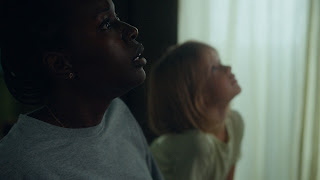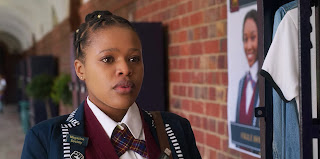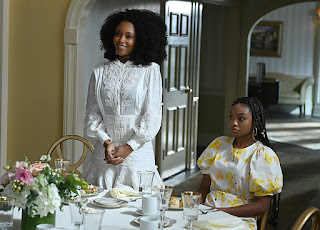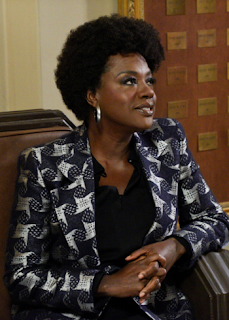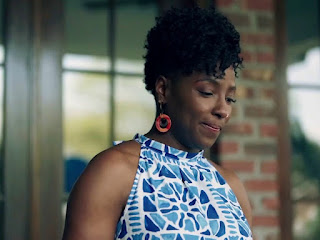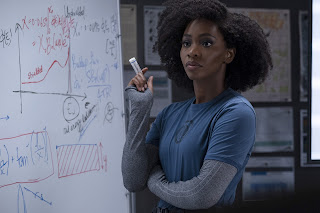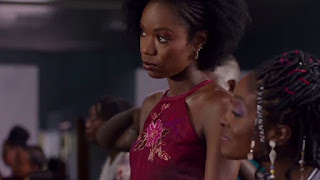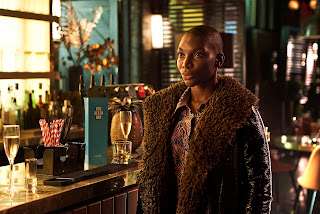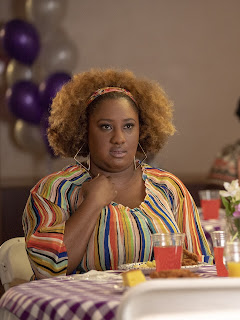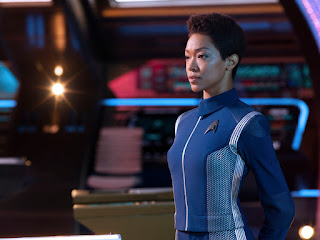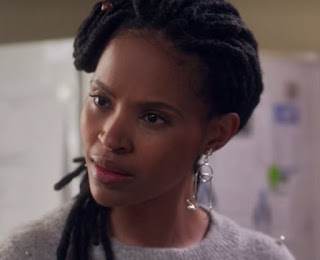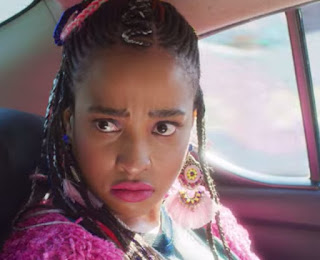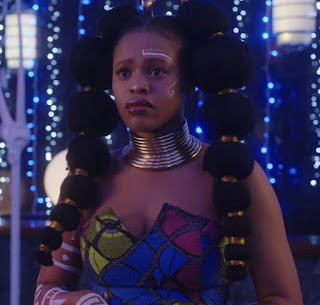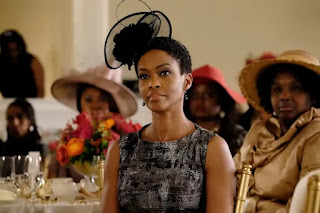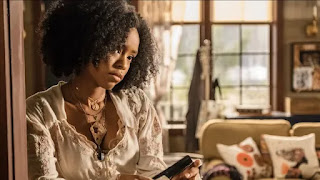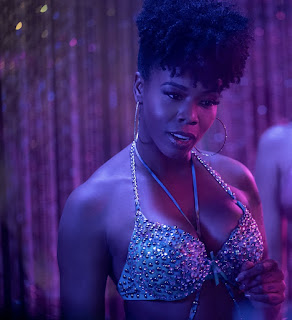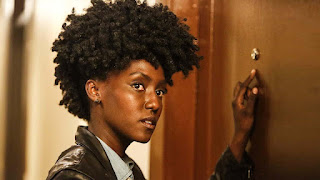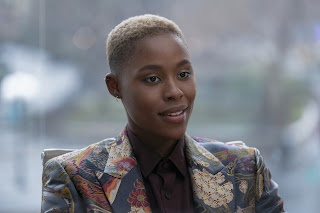“People stay in your life for only a season.”
That’s the line the great late Suzzanne Douglas speaks as Anne Richmond, the mother to Stevie Solomon, an up and coming lawyer facing big decisions between love of a career and love of a new lover. In this tantalizing romance, Really Love, the worldly law student Stevie vibes instantly with the disadvantaged Isaiah Maxwell, a MICA graduated artist at an art opening. This artful backdrop to romance— especially Black romance penned by Felicia Pride and Angel Kristi Williams— has minor reminisces of another charming independent film— Olympia written by its star McKenzie Chinn.
Yet Really Love is the warm fudge brownie straight from the oven and Olympia is various flavored ice cream scoops atop a waffle cone.
 |
| Isaiah (Kofi Siriboe) leisurely painting hard in his own trademark style in Really Love. Also shout out to the late Noah Davis— a wonderful painter. DP: Shawn Peters. |
 |
| After receiving a gallery rejection email, Olympia (McKenzie Chinn) decides to draw in Olympia. DP: Christopher Vinopal. |
 |
| Olympia drawing. DP: Christopher Vinopal. |
Like Isaiah Maxwell, Olympia Welles also has trouble breaking into the art world post college in Chicago. While Washington D.C. based Isaiah has a solid friend to look up to the already well-regarded Yusef Davis, Olympia has her best friend writer Jemma to share her struggle woos. Isaiah and Olympia are both Black artists migrating through the challenges in a system that prioritizes “The Next Big Thing.” Isaiah paints and paints, but Yusef’s interested curator Chenai Hungwe doesn’t think he’s reached full potential yet. That means working and working constantly. Whereas Olympia has a daytime office job and only squeezes in enough time for doodling. Her creative juices are threatened by everyday life stresses including a terminally ill mother. Two exceptionally skilled artists navigating through a gated system must find other avenues to survive— a reality not often taught in art school. Yet scenes feature Isaiah and Olympia making art, still defying the odds set against them. Painting and drawing are their great passions and it’s beautiful to see such love depicted onscreen.
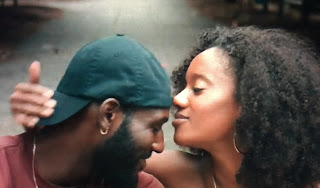 |
| Love is in the air for Isaiah (Kofi Siriboe) and Stevie (Yootha Wong-Loi-Sing). DP. Shawn Peters. |
 |
| Felix (Charles Andrew Gardner) is impressed by Olympia’s (McKenzie Chinn) drawing of him that he requests to be the cover model of her future art book. DP: Christopher Vinopal. |
Furthermore, the lovers of these artists— Stevie and Felix are the breadwinners. Stevie meets Isaiah at Yusef’s crowded art opening; the two instantly hitting it off. On an impromptu outing at a club, Isaiah sweetly walks her home. Afterwards, he gifts her with a painting. At a bar, Felix, a singer/guitarist performs live to an attracted Olympia. The sparks fly over smooth conversation, beer, and innocent photographs. Felix then walks Olympia home and serenades her. Cue the swoon. Now these stories are the true bearers of chivalry and romance, gestures overwhelmingly sweet and sincere. It takes us back to the old-fashioned wooing— gestures that are not overdone, just meaningful reflections of the characters.
 |
| Stevie and Isaiah deciding where to place his gifted painting in her lovely home. DP: Shawn Peters. |
 |
| Olympia and Felix smooching well before even having a first date. DP: Christopher Vinopal. |
Black love is beautiful.
The good parts of the fall—handholding, picnics, wine, fireworks, and chilling— spending affectionate time together whenever possible are shown through visceral detail. The love scenes between Stevie and Isaiah and Olympia and Felix are sensually stirring. The filmmakers successfully highlight their striking chemistries ultimately united with strong, believable bonds that the characters feel for one another.
 |
Yusef (Michael Ealy) gives Isaiah (Kofi Siriboe) advice on inspiration. DP: Shawn Peters.
|
 |
| Olympia (McKenzie Chinn) has a special friend in Jemma (Ericka Ratcliff). They support each other’s creative endeavors despite the challenges pursuing art and writing brings. DP: Christopher Vinopal. |
However, the key problem these relationships have are communication— often the major pitfall in most unions. Stevie and Felix have to understand that artists sometimes have an incapability to properly address certain issues caused by life’s detrimental successes or setbacks. Isaiah’s success is finally rising and due to that, he puts painting above his relationship. His joy has become his financial resource in a society that can turn our best efforts into capitalistic gain, so much so that painting becomes remedial labor. Once her schooling ends, Stevie has a chance of a lifetime for her dream in Chicago. Her severely lacking relationship encourages her to veer in the direction that would be more attentive. Meanwhile Felix already abandoned the musician life for a startup called Henrietta— meaning that he didn’t have the patience to play the waiting game as Olympia and Isaiah. He also has an opportunity to leave the Windy City behind to the sunny skies of California and wants Olympia to come with him. Olympia, however, is at an encompass and withholds her feelings of failure (turning thirty will supposedly do that) and defeat to Felix.
 |
Isaiah is in a major exhibition (along with fantastic artists Jamea Edmond-Richards and Jerrell Gibbs), but curator Chenai (Uzo Aduba) is not impressed yet. DP: Shawn Peters.
|
 |
| Olympia putting herself forward with consultant Gabriela (Charin Alvarez). DP: Christopher Vinopal. |
An artist is always taught to learn to find balance between being too modest and being too arrogant. This is harder still for Black artists who must be very, very humble almost belittle themselves. Still, Isaiah and Olympia take the initiative to follow their goals. Isaiah has the helpful Jusef and Chenai in his corner. Olympia has luck on her side and her lackluster confidence turns into courage in the face of Gabriela— an elegant consultant who’s starting a new zine.
 |
| Stevie (Yootha Wong-Loi-Sing) and Anne (Suzzanne Douglas) discuss a daughter’s future alongside a mother’s past. DP: Shawn Peters. |
 |
| Olympia contemplates her future as her mother, Angie (Penelope Walker) remembers her regrets. DP: Christopher Vinopal. |
Really Love and Olympia wholly invests in its side characters too. Isaiah has good friends in Yusef and Nick and Stevie has her gal pals coffee shop owner Mecca and Sicily. Olympia’s friend Jemma is an up and coming writer suffering from imposter syndrome. Olympia’s older sister Grace is married and raising a young son with her wife AJ. Most interesting are the similar dynamics between Stevie and her mother Anne and Olympia and her dying mother Angie. They hit the same poignancy. As Anne dotes on regretting leaving behind her first and truest love, Angie reflects on her lost career path to becoming an even bigger star. Both mothers are telling their daughters to not let anything get in the way of chasing their dreams.
 |
| Sicily (Naturi Naughton) and Mecca (Jade Eschete) give their bestie Stevie friendly advice. DP: Shawn Peters. |
 |
“Even my friends with usual degrees are having trouble finding jobs,” Grace says to her younger sister Olympia. An art degree is unusual then? Yikes. DP: Christopher Vinopal.
|
 |
| Really Love crew: top—director/co-writer Angel Kristi Williams, co-writer Felicia Pride, Kofi Siriboe (Isaiah), and Yootha Wong-Loi-Sing (Stevie). Middle—Uza Aduba (Chenai), Tristan Mack Wilds (Nick), and Naturi Naughten (Sicily). Bottom—Suzzanne Douglas (Anne), Jade Eshete (Mecca), Blair Underwood (Jerome), and Michael Ealy (Yusef). BlackAndFilmTV. |
Both casts feature a shining array of refreshing talent.
Really Love has the excellent Suzzanne Douglas and Blair Underwood playing Stevie’s judgmental, middle class parents with the award-winning Uzo Aduba as curator Chenwai, Michael Ealy as wise painter Jusef, Naturi Naughton (in a tiny role as Sicily), and
Queen Sugar’s Kofi Siriboe as Isaiah. Casting director Kim Coleman also takes a generous chance on newbies Yootha Wong-Loi Sing as the leading lady Stevie,
Dirk Gently’s Jade Eshete as Stevie’s bestie and stylish girlfriend to Nick played by
Shots Fired’s Tristan Mack Wilds. The smooth jazz and blues infused soundtrack led by Khari Meeten’s rhythm features amazing cuts by Ari Lennox and Meshell Ndegeocello. The film is helmed by two terrific Black women creators—both previously seen at my favorite film festival, Blackstar— Angel Kristi Williams’
Friendzone L. A. and Felicia Pride’s
tender. This work was told through gentle, precious hands.
 |
| Olympia cast—Penelope Walker, Sadieh Rifai, Charles Andrew Gardner, McKenzie Chinn, and LaNisa Renee Frederick from Instagram. |
Olympia nods to the local Chicago scene beginning with poet McKenzie Chinn as Olympia, Charles Andrew Gardner as Felix, LaNisa Renee Frederick as Olympia’s sister Grace, Ericka Ratcliff as Jemma, and Penelope Walker as Angie. The musical composition has more independent pop which harmonizes with Kaitlin Martin’s quirky animations. Director Gregory Hix is able to celebrate the beauty of Chicago and push Chinn’s relatable story forward.
 |
Her in the private collection of the artist— enough said. DP: Shawn Peters.
|
 |
| Charles and Olympia are embarking on new destiny together. DP: Christopher Vinopal. |
Really Love (on Netflix) and Olympia (Amazon Prime/Hoopla) are important examples of the refreshing perspective film can venture when Black women are given the chance in the directing and writing realm. Black people are more than slaves, mammies, and other tired Hollywood tropes— we are visual artists too. We love to paint and draw. Our navigation through the system dominated in white art canon may be a tough hurdle to overcome (with many never able to jump the high obstacles), but triumphant people like Isaiah and Olympia exist. They sometimes fall in and out of love. Stevie and Felix as well as a valid support systems champion them.
Both films, also currently streaming on kanopy, are the perfect double feature for those looking for solid back to back Black romances with art in mind.






































